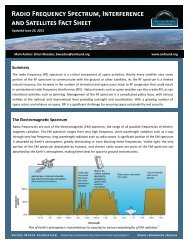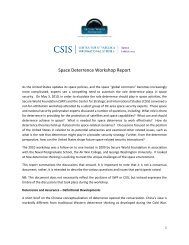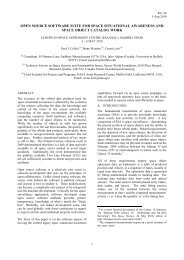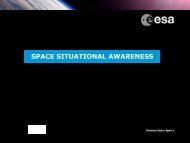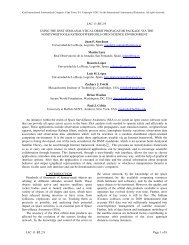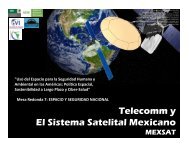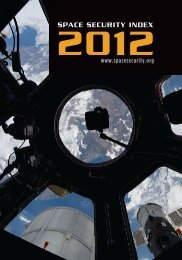Space Security Index
Space Security Index
Space Security Index
Create successful ePaper yourself
Turn your PDF publications into a flip-book with our unique Google optimized e-Paper software.
satellites in LEO. 43 Japan is an important international partner of the U.S. on ballistic missile<br />
defense and has its own Aegis system. In 2007, a Japanese destroyer successfully performed a<br />
sea-based midcourse intercept against an exoatmospheric ballistic missile target. 44<br />
Notably, in 2008, the U.S. recongured an anti-missile system to destroy failing satellite<br />
USA-193 as it deorbited. Modications were made to enable a Raytheon SM-3 missile to<br />
destroy the satellite before it reentered Earth’s atmosphere. While this event demonstrated<br />
the ability to recongure a missile to be used against a satellite, the U.S. has stressed that it<br />
was a “one-time event,” 45 not part of an ASAT development and testing program.<br />
Russia developed an anti-satellite system called the Co-Orbital ASAT system, designed<br />
to launch conventional explosives into orbit near a target satellite via a missile, which<br />
maneuvers toward the satellite, then dives at it and explodes. 46 Russia has continued to<br />
observe a voluntary moratorium on anti-satellite tests since its last test in 1982. e precise<br />
status of its system is not known, but it is most likely no longer operational. 47 Russia has<br />
also developed a long-range (350-km) exoatmospheric missile, the Gorgon, for its A-135<br />
anti-ballistic missile system. 48<br />
China has developed an advanced kinetic anti-satellite capability, demonstrated by its<br />
intentional destruction of a Chinese weather satellite in 2007 using what is believed to be a<br />
vehicle based on a medium-range, two-stage, solid-fuelled ballistic missile, possibly the DF-<br />
21. 49 However, China called the event an experiment, not an anti-satellite test. 50 China is<br />
not believed to currently have enough interceptors for a full ASAT system that could destroy<br />
multiple satellites in LEO, although it could produce more. 51 e U.K., Israel, and India<br />
have also explored techniques for exoatmospheric interceptors. 52<br />
Nuclear weapons<br />
A nuclear weapon detonated in space generates an electromagnetic pulse that is highly<br />
destructive to unprotected satellites, as demonstrated by the U.S. 1962 Starsh Prime test. 53<br />
Given the current global dependence on satellites, such an attack could have a devastating<br />
and wide-ranging impact on society. As noted above, both the U.S. and USSR explored<br />
nuclear-tipped missiles as missile defense interceptors and ASAT weapons. e Russian<br />
Galosh ballistic missile defense system surrounding Moscow employed nuclear-tipped<br />
interceptors from the early 1960s through the 1990s. 54<br />
China, the member states of the European <strong>Space</strong> Agency, India, Iran, Israel, Japan, Russia,<br />
and the U.S. possess space launch vehicles capable of placing a nuclear warhead in orbit,<br />
although the placement of weapons of mass destruction in outer space is specically<br />
prohibited by the 1967 Outer <strong>Space</strong> Treaty (see chapter 3). North Korea and Pakistan are<br />
among the 18 states that possess medium-range ballistic missiles that could launch a mass<br />
equivalent to a nuclear warhead into LEO without achieving orbit.<br />
Eight states are known to possess nuclear weapons: China, France, India, Israel, Pakistan,<br />
Russia, the U.S., and the U.K. North Korea has an ongoing nuclear program and attempted<br />
to detonate a nuclear device in 2006. 55 Iran reportedly ended its nuclear weapons program<br />
in 2003, but the International Atomic Energy Agency continues to investigate potentially<br />
illegal uranium enrichment activities. 56<br />
<strong>Space</strong> Systems Negation<br />
153



